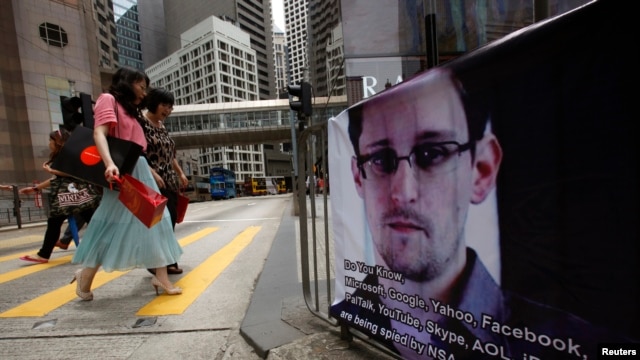
A poster supporting Edward Snowden, a former contractor at the National Security Agency who leaked revelations of U.S. electronic surveillance, is displayed at Hong Kong's financial Central district June 17, 2013.
The British newspaper The Guardian says a former U.S. intelligence contractor who recently exposed some U.S. surveillance operations has denied he had any contact with the Chinese government.
The newspaper said Edward Snowden made the comment Monday in a live question and answer session with Internet users, hosted on The Guardian website. Snowden has been hiding in the autonomous Chinese territory of Hong Kong since leaking U.S. intelligence documents to several newspapers earlier this month.
Former U.S. Vice President Dick Cheney denounced Snowden as a "traitor" in a Sunday television interview, warning that the former National Security Agency contractor could provide classified U.S. information to Chinese authorities.
In Monday's online interview, Snowden is quoted as calling Cheney's assertion a "predictable smear" and saying that being labeled a "traitor" by the former vice president "is the highest honor you can give an American."
Snowden's comments could not be independently verified.
Chinese Foreign Ministry spokeswoman Hua Chunying also denied that Snowden has spied for China, calling the suggestion "complete nonsense."
In her Monday briefing, Hua urged U.S. authorities to pay attention to international concerns about their surveillance operations and provide what she called a "necessary explanation." It was the first comment by a Chinese official on the NSA leaks.
In another part of the online interview, The Guardian quoted Snowden as saying U.S. intelligence analysts have the ability to view the content of U.S. citizen phone and e-mail communications without a warrant, provided that they label such data collection as "incidental" to the search for suspected terrorists.
Snowden also criticized other U.S. political figures including President Barack Obama, senior members of Congress and Director of National Intelligence James Clapper. He accused them of colluding to expand a "suspicion-less surveillance" operation that he described as an abuse of human rights.
The former NSA contractor did not mention any specific cases of U.S. intelligence operatives viewing private communications of Americans and did not give any examples of alleged rights abuses by those operatives.
Some U.S. officials and lawmakers have accused Snowden of damaging national security by tipping off U.S. enemies about previously-secret surveillance programs and enabling them to change tactics. Snowden rejected that charge, saying "I did not reveal any U.S. operations against legitimate military targets."
Snowden fled to Hong Kong last month and has vowed to use its British-rooted legal system to fight any attempt to extradite him to the United States. The U.S. Federal Bureau of Investigation has said Snowden is under criminal investigation but it has not filed any charges against him or asked for his extradition.
In an earlier report Monday, The Guardian said documents leaked by Snowden show that Britain spied on diplomats attending the 2009 Group of 20 summit in London.
The newspaper said Britain's eavesdropping agency, the General Communications Headquarters or GCHQ, hacked into the phones and computers of Turkish and South African delegates at the summit. It said the GCHQ also tricked some G-20 delegates into using Internet cafes that it secretly modified to intercept diplomatic communications.
The Guardian published redacted versions of some of the documents, but their authenticity could not be immediately confirmed. Their release coincided with Britain hosting the first day of a Group of Eight industrialized nations summit in Northern Ireland.
|
|
